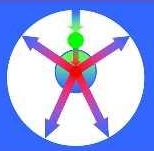 René Van Someren René Van Someren
Thought to Behaviour (TtB): An integrative explanation of human behaviour
Posted May 1, 2017
Adapted from: Source: "Van Someren, R., 2017, Thought to Behaviour (TtB): An integrative explanation of human behaviour [PDF version]. Retrieved from http://www.vansomeren.com/books/TtB.pdf, ISBN/EAN: 9789079641116"
My latest publication on human behaviour is titled:
Thought to Behaviour (TtB): An integrative explanation of human behaviour
(ISBN/EAN: 978-90-79641-11-6)
This booklet may be
downloaded from http://www.vansomeren.com/books/TtB.pdf and distributed freely and
without a charge, provided its integrity is maintained and all other rights are observed.
Readers are invited to donate any amount of money they
choose towards brain & behaviour research.
As its title suggests, the booklet proposes Thought to Behaviour (TtB) theory as an integrative explanation of non-instinctive,
non-reflexive human behaviour. Building on existing research, the theory’s main
propositions were formed. Subsequently, those propositions were illustrated by
examining empirical research.
According to TtB, objects of
thought are source initiators of non-instinctive, non-reflexive human
behaviour. Ones personal interpretation of the function and consequences of an
object of thought is the first derivative of that particular object of thought.
Ones subjective attitude towards that personal interpretation is the second
derivative of that particular object of thought. Most attitudes are affective,
facilitative or assertive. Human behaviour is ultimately determined by the
outcome of mutual influence and competition of attitudes that an individual
finds relevant directly prior to, or during acting.
TtB covers and supports
various existing theories explaining human behaviour. TtB also offers a basis
to classify various existing intervention techniques in various applied
disciplines within psychology, such as clinical psychology and organisational
psychology.
Behaviour change interventions can focus on any stage
of the behaviour development process. Most successful seem to be appropriate
combinations of techniques, of foci and of delivery modes. In the absence of a
proven behaviour change technique for a specific situation, a proposed 10-step
procedure could help bring about desired behaviour.
The booklet also briefly
addresses commonalities between Thought to Behaviour (TtB) and Cognitive
Behaviour Therapy (CBT).

TtB relates to all human behaviour, including social and
organisational issues. For instance, TtB explains the importance of attitudes
in human behaviour. Human behaviour determines organisational behaviour. If one
should know the essential aspects of organisations, one might be able to infer
organisational members’ attitudes towards those aspects. This might even allow
quantification of organisational behaviour. Such quantification might be
valuable for diagnosing organisational behaviour and for monitoring and
realising organisational developments.
Since this all may come across as vague, in future
postings I shall address the Elementary Model of Organisational Processes
(EMOP)" explaining the essential aspects of organisations, and the Elementary
Model Questionnaire (EMQ) that can serve to quantify organisational behaviour.
Keywords: human behaviour, Thought to Behaviour (TtB),
behavioural change techniques, objects of thought, interpretation, attitude.
For more information about donating towards brain &
behaviour research, you may contact any of the following institutes, or any
other generally approved institute for brain & behaviour research.
The booklet may be cited as:
Van Someren, R. (2017), From Thought to Behaviour (TtB): An integrative explanation of human behaviour
[PDF version]. Retrieved from http://www.vansomeren.com/books/TtB.pdf.
Dr. René Van Someren’s personal website is: http://www.rene.vansomeren.org
|